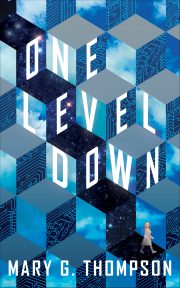Guest Blog Post: Fitzhenry and Whiteside–Writer Beware
Posted by Victoria Strauss for Writer Beware
 Today’s guest post by multi-published author Doranna Durgin is about a publisher behaving badly.
Today’s guest post by multi-published author Doranna Durgin is about a publisher behaving badly.
More than that, however, it highlights something that every writer signing a publishing contract needs to be aware of: the importance of reversion clauses (which publishers often like to keep as vague as possible so they can hold on to rights for as long as possible), and the problems that can arise even when authors and their agents re-write open-ended reversion clauses to make them more precise.
This post was originally published at Doranna’s blog, where an active conversation is ongoing in the comments thread.
————————————-
by Doranna Durgin
When hikers Dayna and Eric find a young woman naked, terrified, and speechless, they’re sure she’s the victim of foul play. But the truth is much more shocking: she isn’t human at all. She’s Dun Lady’s Jess, a horse transformed into this new shape by the spell that brought her and her rider, to whom she is utterly devoted, into this world.
 Possessed now of human intelligence but still a horse deep inside, Jess desperately searches this world for her master and rider, using her fiery equine spirit to take on human idiosyncracies–and human threats.
Possessed now of human intelligence but still a horse deep inside, Jess desperately searches this world for her master and rider, using her fiery equine spirit to take on human idiosyncracies–and human threats.
Dun Lady’s Jess is my heart book—my first book. A fantasy, it was first published by Baen in 1994, and in 1995 it won the prestigious Stephen Tall/Compton Crook Award for Best First SF/F/H of the year. It grew two sequels, and it stayed in print for a good long run—but eventually, some years later, it fell off the shelves and the rights reverted to me.
Halfway through the next decade, I was invited by a delightful editor to reprint the book through the new Star Ink imprint of the Canadian publisher Fitzhenry and Whiteside. We had a wonderful time with the new edition, giving painstaking attention to the details large and small. It became stalled in production, however, and by the time it was released, the editor had chosen to part ways with the publisher. Eventually the book was released under Fitzhenry and Whiteside’s Red Deer Press line.
The reversion clause for Dun Lady’s Jess reads:
“16.(a) If the Publisher fails to keep the Work in print *through regular trade channels* and for sale and written demand from the Author declines or neglects to reprint it within six (6) months thereafter and to offer it for sale, or after two (2) years from the date of the first publication the Publisher wishes to discontinue publication of the Work and gives three (3) months’ notice to this effect to the Author in writing.”
The part between asterisks? My agent and I added that to the boilerplate, because the clause as it stood was far too open-ended. The new phrase was approved and initialed by both myself and Richard Dionne, for Fitzhenry and Whiteside.
(The part right after the asterisks? Yes, it seems to be missing a word—probably “upon.” But that’s part of the boilerplate.)
The book was published in November 2007, although the U.S. distribution didn’t take place until April 2008. By spring of 2010, it was evident, through royalty reports, that the book wasn’t being placed on the shelves anywhere (that is, “regular trade channels”). For a couple of years now, it’s sold only a handful of copies per year, and has slowly slid off availability via online sources. (see the screenshot below).
But when we asked for reversion of rights, the response shocked us: if I would buy the considerable copies the publisher had sitting in their warehouse, they would revert the book. I have to tell you…it felt like coercion.
We responded that this wasn’t possible, and reminded them that they naturally had the ability to sell their remaining stock should the rights to the book be reverted. In other words, for them, nothing would change.
But they didn’t respond to that email, nor to the one after that, or the one after that, or to the phone call by the book’s original editor with that line, or—after we’d let the situation sit for a year—to the query after that.
We sent screenshots of the book’s lack of availability and its failure to appear in any distributor warehouse. It’s in the publisher warehouse alone—which does not equal being available through regular trade channels. We also sent a PDF of the relevant contract page with the initialed changes to their boilerplate. This material went out return receipt—and finally, we received a promise to review the situation and get back to us in a week.
 |
| Dun Lady’s Jess: The warehouse listing. Unlike books that are available through regular trade channels, this title is stocked only in the Fitzhenry and Whiteside warehouse |
This did not happen.
After another nudge—which included the reminder that the publisher could continue to sell warehoused copies in their usual fashion, as well as a reminder of the boilerplate changes–we were finally told: “This book is in stock, on sale on our website, it continues to sell albeit in lesser quantities. [my note: yes, a handful of copies a year] We have some 1,600 in stock with no reason to revert rights. “
How about because it’s a contractual obligation?
Finally, I went to SFWA GriefCom. You may not have heard much about this committee; when GriefCom mediates a dispute, the parties involved maintain a strict nondisclosure; no one’s dirty laundry is aired. And because they see a high level of success, that means you see very little dirty laundry and very little about GriefCom.
In this case, the request from GriefCom to Fitzhenry and Whiteside was simple: Revert the book per the contract obligations, or provide proof that the book is available via regular trade channels.
It took a week of trying for GriefCom to connect with Richard Dionne, at which point we were given a promise that Red Deer would provide proof of distribution within a week.
This did not happen.
After three weeks of silence and unreturned phone calls, GriefCom sent a different kind of request, giving Red Deer forty-eight hours to either revert the book or provide proof that it was being sold via regular trade channels, and asserting that after that, I would be forced to take additional steps.
Early the next day, I heard from the GriefCom chair that he had received a phone call, and that the unidentified caller took him to task in no uncertain terms–claiming harassment, declaring there would be no reversion on the title, and warning that she would “report” us to [prominent Canadian SF writer #1] and [prominent Canadian SF writer #2]—all before hanging up on him.
We took this as an indication that the publisher no longer wishes to interact with GriefCom.
Finally—knowing that truly, no one wants a big dramafest, I emailed Richard Dionne and made the same request: Please send either the reversion or the proof that Dun Lady’s Jess is being sold via regular trade channels, and please do so within the next three business days.
This did not happen.
I don’t have a lot of options left, but I do have some. For one thing, I have this: I can break the silence that protects Fitzhenry and Whiteside from the consequences of their actions—a silence I’ve kept for a year and a half. And I can do it to warn everyone possible, via the big wide Internets: This is my documented experience with this publisher. We have a contract clause that was approved and initialed, but is not being honored. A critical contract clause—one that protects my interests in my book per the agreed-upon terms. A contract clause that is of utmost importance these days, when publishers and writers are scrambling to negotiate shifting terms and a shifting industry.
A contract clause no writer should take lightly.
Meanwhile, I still want my book back. I still want Fitzhenry and Whiteside to honor the contract they signed. Contracts are not a thing of convenience, to be ignored when a publisher pleases. “Make me,” isn’t in a professional lexicon…or shouldn’t be. If you feel the same, I hope you’ll pass this warning along.
Doranna Durgin responded to all early injunctions to “put down that book/notebook and go outside to play” by climbing trees to read and write. Such quirkiness of spirit has led to an eclectic publishing journey, spanning genres over 30 novels to include mystery, SF/F, action-romance, paranormal, franchise, and a slew of essays and short stories.


